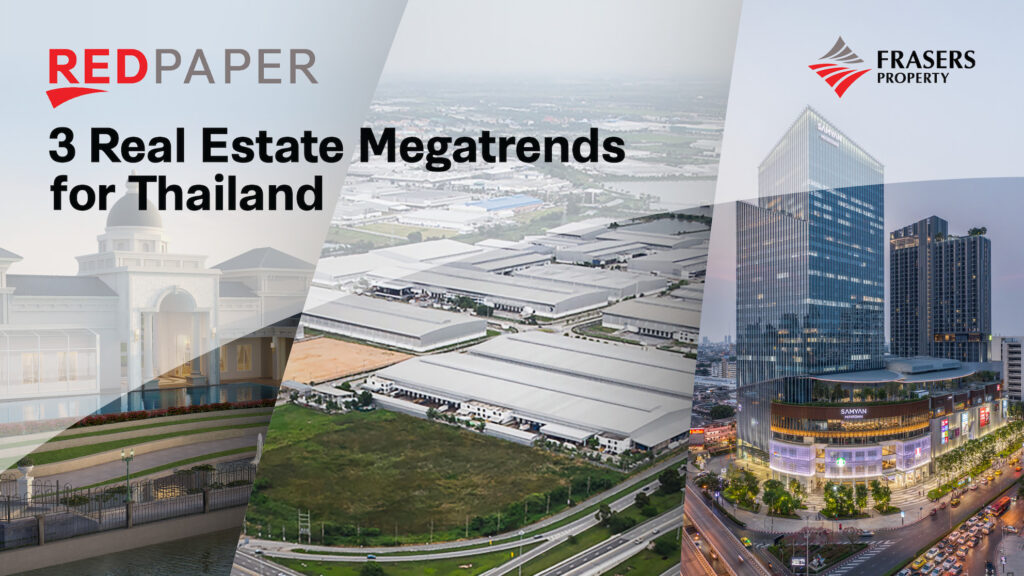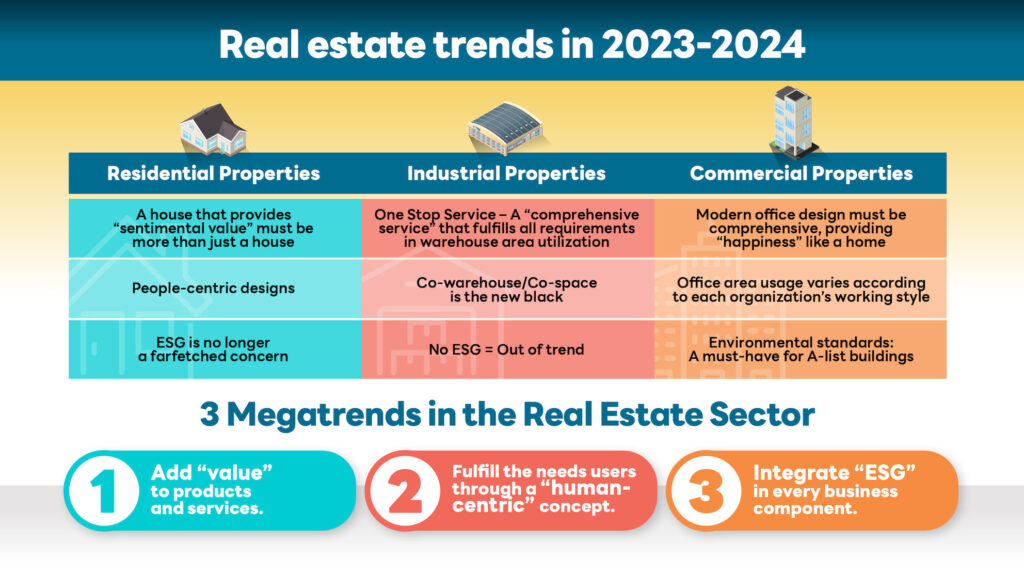REDPAPER reveals three real estate megatrends for Thailand: Adding
value to products and services through a human-centric approach,
and by applying an ESG framework

BANGKOK, 20 MARCH 2023
REDPAPER unveiled three real estate megatrends for residential, industrial, and commercial properties, showing how real estate developers can elevate their products and services by further unlocking and enhancing their value. This can be achieved by accommodating the various needs and lifestyles of consumers, adopting a human-centric approach that understands and places different consumer behaviors at the center of the development process, and applying an ESG framework in business guidelines to reduce social and environmental impacts resulting in more robust and sustainable growth.
The fourth REDPAPER, an insight report on real estate data and trends by Frasers Property Thailand Public Company Limited (FPT), in collaboration with Numbers 10 Research Company Limited, closely addresses Thailand’s real estate megatrends for residential, industrial, and commercial properties in addition to describing three emerging megatrends which provide useful insights in the direction of real estate over the next one to two years.
#1 Adding “value” to products and services
Based on the properties survey, how developers emphasize and add value to products and services is a crucial factor which must be prioritized by real estate developers as this can help elevate the consumer experience. The residential property survey showed that consumer demand for single-family housing increased significantly – from 33% in 2021 to 44% in 2022, due to the exceptional value single-family homes provide to homebuyers, for instance, how developers pay attention to details, such as selecting materials and furniture pieces that reflect the identity and taste of consumers or by providing extra spacing which can be customized. For factory and warehouse rentals, tenants are looking for developers that provide extensive service capabilities, including warehouse management services, allowing them to maximize their productivity.
As for office design, developers need to cover the necessary functions, facilities, and various types of spaces to suit different purposes and create an atmosphere that makes employees feel at home. According to the survey, 49% percent of office workers would like to see more green spaces, 33% noted that an area with nice views can help to boost inspiration and motivation, while 30% want to work in flexible office settings.
#2 Human-centric development
Developers are gearing up towards a more human-centric approach that prioritizes consumers by placing them at the center of the development process. For residential developments, developers are focused on meeting the requirements of consumers by designing housing and functionality that suit the behaviors and ever-changing lifestyles of each generation. As for evolving office building developments, a mixture of fixed and co-working spaces is needed for different types of businesses and based on the varying number of employees in each company. Furthermore, organizations are showing an interest in adjusting their workspaces for more flexibility, enhancing agility and efficiencies in business cost management.
Apart from providing ready-built or built-to-suit spaces for major clients, there is an opportunity for industrial property developers to expand their services to small and medium-size clients through co-warehouse and co-space sharing. This will provide flexibility to businesses when it comes to rental expenses.
#3 Integrating “ESG” in every business component
An environmental, social, and governance (ESG) framework is essential for business operations in many organizations. With the drastic impacts of climate change in recent years, consumers are becoming increasingly environmentally conscious, and more willing to consider whether their choice of products or services from companies adhere to socially and environmentally responsible policies.
According to the survey, higher numbers of construction product manufacturers prefer natural materials with less environmental impacts, and they would also adjust the formula to maximize resources. From a contractor’s point of view, developers are also becoming more sensitive to the environmental impacts of their raw materials and product selection despite the higher cost. For factories and warehouse construction, multinational companies are now prioritizing their carbon footprint and net zero emission goals; thus, renewable clean energy systems and how facilities can enhance the lives of their employees are becoming all the more essential. Office buildings with LEED and WELL building standards will gain a distinct advantage in attracting multinationals as tenants.

REDPAPER believes that these three megatrends are the key challenges that need to be addressed by real estate developers through a more forward-thinking approach. Rapidly adapting to accommodate the ever-changing needs of consumers, users, and partners can help developers gain an important advantage, staying one step ahead of their competitors while achieving higher and sustainable business growth.
For the full REDPAPER report, please visit www.frasersproperty.co.th/th/downloads/redpaper

